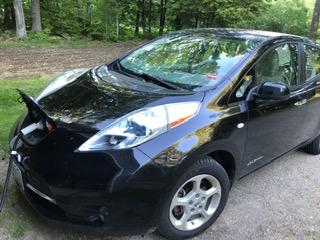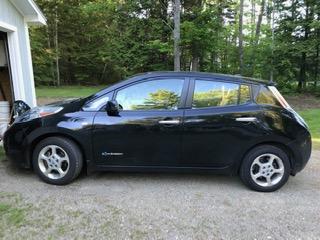Use of electric vehicles needs to be encouraged in Maine, and U.S.
Electric vehicles are both cost effective and environmentally friendlier than gasoline powered vehicles. A battery electric vehicle is a “fully electric, zero-emission vehicle that has an on-board electrical energy storage device that is designed to be recharged using an external energy source.”
Electric cars use energy from the rechargeable battery, which is charged with household electricity. The motor gets energy from a controller which is controlled by the driver’s use of the “gas” or accelerator pedal. Electric cars are quiet, something many people find intriguing, and have many benefits that make them superior to gas powered cars.
The average cost to operate an electric vehicle in the United States is $485 per year while the average cost for gasoline powered vehicles is $1,117. Electric vehicles are cheaper to operate because they do not need the routine maintenance gas cars do, such as oil changes and emission checks, and there is no need to buy gas (prices that rise by the day).
Electric vehicles are also more convenient, in ways, than gas cars because they can charge at home and only take hours to do so (some highways in Washington D.C. can charge a battery to 80% in about 30 minutes!). Also, some electric cars can get between 115 and 200 miles on one charge, while the average, gas powered cars, get around 25 miles per gallon.
Charging at home also means there is never the need to stop at a gas station during a trip, unless the battery needs to be charged, that is. But even then, the stops will be less frequent because the electric vehicle average is much longer than the gas powered average.
Electric vehicles are also environmentally friendly. The average gas powered passenger vehicle emits about 4.6 metric tons of carbon dioxide per year (this number varies depending on a vehicle’s fuel and the number of miles driven per year).
Electric cars emit no carbon dioxide, leading to cleaner air. With electric vehicles, there is a reduced dependency on oil or energy sources that are non-renewable and pollutants to the environment. Producing the electricity does add to the emissions through the utility company, however, the amount of emissions can barely compare to gas cars.
Electric cars are also safer than gas cars. They tend to have lower centers of gravity, making them less prone to tipping or rolling over. They have a lower risk of fires or explosions in collisions because they do not have flammable gas engines. In addition, electric cars are required to pass the same safety tests as gas powered vehicles.
According to the Union of Concerned Scientists, less than 1% of U.S. households own an electric car, but about 42% have the ability to. Fifty-six percent of U.S. households have access to charging, 95% of U.S. drivers have, on average, about 4 passengers (the capacity of electric cars), and 79% of families do not require hauling.
Sixty-nine percent of U.S. drivers drive less than 60 miles on weekdays, a distance well within the range of most electric cars. Also according to the Union of Concerned Scientists, if everyone who could use an electric vehicle had one, we would save 350 million barrels of oil a year.
Many people are worried about the range of an electric car, however, the range is quickly increasing as more models are being made. Today, the range is about 80-200 miles, depending on the car. By 2022 it is predicted that the average range will be 275 miles and by 2028 possibly 400 miles.
My family owns a 2012 Nissan Leaf and we can drive, at maximum, about 80 miles per charge.
It is perfect for my family as it is rare that my mother or father have to drive more than 12 miles to get to work on weekdays. We have had an overall great experience with the Leaf. When we first bought our Leaf it did take some getting used to, especially the need to always keep in mind how far we could go without charging. There were a few times when we were close to 0 miles before we made it back to our home, but with time, my family became more comfortable and used to the changes.
We spend about 40 dollars a month in additional electric charges but we used to spend approximately 40 dollars a week for gasoline in the car that the Leaf replaced. When comparing costs of the Leaf to a gas powered vehicle, the Leaf gets the equivalent of 114 miles per gallon.
I would like to conclude this article by emphasizing that as our world continues to advance and create new things, many of which will pollute our environment, it is important that electric cars be promoted and be more widely used among not only Maine but the United States and even the world.
If electric cars continue to develop and improve, more people will recognize the benefits and join this trend. Electric vehicles have an ever lasting positive effect on the environment as they will have a significant influence on the decrease in CO2 emissions.
I am hoping that Maine can set an example for other states, influencing and inspiring them to begin their journey using electric vehicles.





























